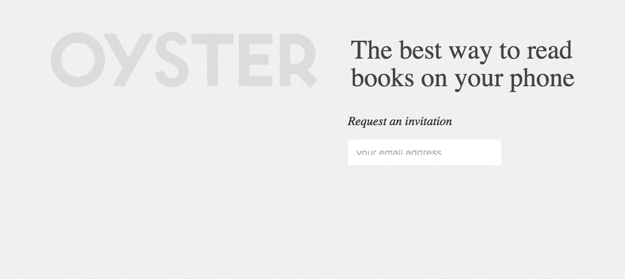 By now, we’re used to the subscription streaming model for both visual and audio entertainment, with Netflix, Amazon Prime, Spotify, Pandora et al having convinced us that we don’t really need to own media anymore as long as we have a strong wifi connection and the right kind of device in order to enjoy it wherever and whenever we want. But how far will this thinking stretch, exactly? Could you see yourself signing up for a monthly subscription to an ebook library?
By now, we’re used to the subscription streaming model for both visual and audio entertainment, with Netflix, Amazon Prime, Spotify, Pandora et al having convinced us that we don’t really need to own media anymore as long as we have a strong wifi connection and the right kind of device in order to enjoy it wherever and whenever we want. But how far will this thinking stretch, exactly? Could you see yourself signing up for a monthly subscription to an ebook library?
It’s an interesting question. After all, prose books aren’t exactly the same kind of “passive” media as music, or even movies or television; you rarely (if ever) hear of someone reading a book in the background while engaged in other activities in the same way that they might listen to music or even half-pay attention to whatever’s on the television in the room, for example. Reading a book requires a commitment that changes our relationship with the media, and may mean that readers are more likely to purchase their ebooks rather than rent them. Not that there’s not a long history of “renting” books, which is another potential bump in the road for the paid subscription model for ebooks: There’s such a thing as your local library, which does much the same thing, but for free (There is also Amazon’s Kindle Lending Library, which is free for Amazon Prime subscribers, of course).
None of this has scared off the Oyster start-up, however.
The New York-based company is the brainchild of Eric Stromberg, Andrew Brown and Willem Van Lancker, who collectively wrote in a debut blog post that the company was “inspired by the belief that the transformation from the print book to digital is still in its earliest phase,” and the result of thinking “deeply about the future of long-form narrative.” Aimed at, in their words, “an audience that aspires to read more,” the app will allow users to read as much as they want from “an ever-growing library of books” for a single monthly price.
The focus on smartphones means a reformatting of the books themselves, it seems. “Today’s book reading products were never envisioned with phones in mind – they are incomplete and shrunken copies of their tablet counterparts,” explains the blog post, adding that Oyster will be “an end-to-end product created specifically for mobile.” But that won’t be the only differentiator from print books or digital copies from other sources; Stromberg, Brown and Van Lancker explain that what may truly appeal to hardcore readers is Oyster’s superior discovery process. “Currently, people buy books online in the exact same way that they buy lamps, blenders and kitchen knives,” they explain. “The process of finding your next book is very different from purchasing a knife, and it should be treated that way.”
Oyster is currently in the process of signing up new investors as well as publishers and authors interested in adding their books to the company’s library. No launch date nor subscription cost has been revealed as yet.


